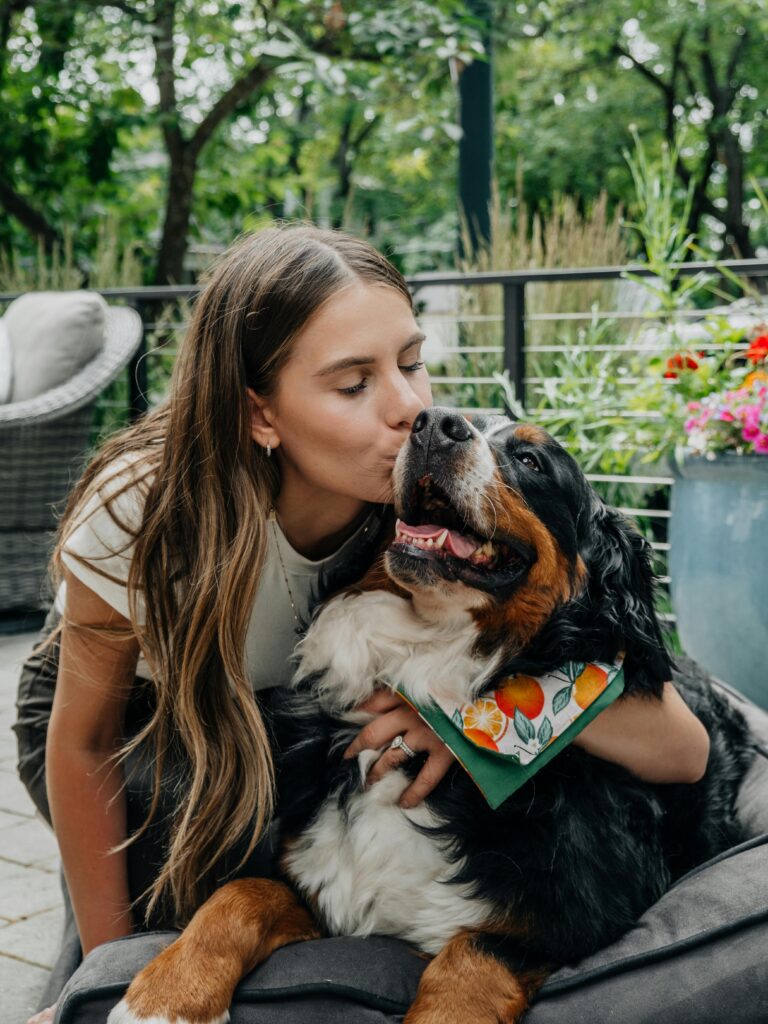If your dog’s health is on the decline, it can be worrying and upsetting. Dogs are cherished members of our families, and when they begin to show signs of illness or discomfort, it’s only natural to be concerned. However, there are many possible reasons for a decline in your dog’s health, ranging from the natural aging process to diet, lifestyle factors, or underlying medical conditions. The key to improving or managing your dog’s health lies in identifying the root cause as early as possible and taking appropriate steps to address it.
1. Age-Related Decline
As dogs age, they experience physical changes just like humans. Senior dogs are more prone to age-related issues such as arthritis, muscle loss, vision and hearing impairments, and cognitive decline (often referred to as canine cognitive dysfunction or “dog dementia”). These conditions can make your dog slower, less active, or less responsive, contributing to an overall decline in their well-being.
Common Age-Related Signs:
Slower movement or reluctance to exercise
Stiffness, especially after resting or on colder days
Cloudy eyes or difficulty seeing
Hearing loss, such as not responding to your voice
Disorientation or confusion in familiar settings
While aging is inevitable, there are ways to manage the symptoms and improve your dog’s quality of life. Regular vet check-ups, supplements like glucosamine for joint support, and tailored exercise routines that match your dog’s physical abilities can all help.
2. Nutritional Deficiencies or Imbalanced Diet
Proper nutrition is the foundation of good health. A diet that is lacking in essential nutrients, such as vitamins, minerals, or high-quality protein, can lead to a range of health problems, including a weakened immune system, poor coat quality, and digestive issues. Conversely, overfeeding or giving your dog too many treats (especially those high in calories or fat) can lead to obesity, which brings its own set of health complications, such as heart disease, diabetes, and joint problems.
Signs of Poor Nutrition:
Dull, dry coat or excessive shedding
Weight gain or loss
Low energy or lethargy
Digestive problems like diarrhea or constipation
Itchy or inflamed skin
If you’re unsure whether your dog’s diet is meeting their nutritional needs, consult your veterinarian. They can recommend high-quality dog foods and, if necessary, suggest supplements to address any specific health concerns. Keep in mind that as your dog ages, their dietary needs might change, and switching to a senior dog formula could be beneficial.
3. Lack of Regular Exercise and Mental Stimulation
Exercise is crucial for your dog’s physical health, but it’s also vital for their mental well-being. Dogs that don’t get enough exercise can become overweight, which can lead to a host of health problems such as joint pain, heart issues, and respiratory difficulties. In addition to physical exercise, mental stimulation through interactive play, training, or puzzle toys can keep your dog’s mind sharp and prevent boredom, which can sometimes manifest as anxiety or destructive behavior.
Consequences of Lack of Exercise:
Weight gain or obesity
Muscle atrophy or weakness
Restlessness or hyperactivity
Boredom-related behaviors like chewing, digging, or excessive barking
Anxiety or depression
Tailoring your dog’s exercise routine to their age, size, and breed is important. For younger dogs, long walks, hikes, or runs may be ideal, while older dogs may benefit from shorter, gentler walks and swimming, which is easy on their joints.
4. Undiagnosed Health Conditions
Many serious health conditions can remain undiagnosed for some time, as dogs often don’t show symptoms until the disease has progressed. Conditions such as kidney or liver disease, diabetes, or cancer can lead to a noticeable decline in your dog’s health, but the early warning signs may be subtle. Routine veterinary check-ups are crucial to catching these conditions early, allowing for timely treatment and better outcomes.
Potential Warning Signs:
Excessive drinking or urination (could indicate diabetes or kidney issues)
Sudden changes in appetite (either increase or decrease)
Vomiting, diarrhea, or other gastrointestinal issues
Unexplained weight loss or gain
Unusual lumps or bumps under the skin
If you notice any of these symptoms, don’t wait—bring your dog to the vet for a full examination. Blood tests, X-rays, and ultrasounds can help diagnose these underlying issues early, giving you and your vet a better chance to manage or treat the condition.
5. Dental Problems
Oral health is often overlooked, but dental issues can significantly impact your dog’s overall health. Gum disease, tooth decay, and oral infections can cause pain, difficulty eating, and even lead to systemic problems, such as infections that spread to the heart or kidneys.
Signs of Dental Problems:
Bad breath (often a sign of gum disease)
Difficulty chewing or avoiding food
Drooling more than usual
Swollen or bleeding gums
Loose or missing teeth
Regular dental check-ups, brushing your dog’s teeth, and providing dental chews can help keep your dog’s mouth healthy. If your dog is showing signs of dental pain, schedule a vet appointment for a thorough cleaning or treatment.
6. Parasites and Infections
Fleas, ticks, and internal parasites such as worms can cause significant health issues if left untreated. External parasites like fleas and ticks can lead to skin infections, allergic reactions, or even diseases like Lyme disease. Internal parasites, including roundworms, hookworms, or tapeworms, can cause malnutrition, digestive issues, and in severe cases, anemia.
Symptoms of Parasites:
Itchy skin or excessive scratching
Visible fleas or flea dirt on the skin
Diarrhea or vomiting
Bloated abdomen (especially in puppies)
Weight loss despite normal eating
Keeping up with regular flea, tick, and worm prevention treatments is key to avoiding these problems. If your dog has visible signs of parasites, your vet can recommend the appropriate treatment.
7. Stress, Anxiety, or Environmental Changes
Dogs can be highly sensitive to changes in their environment or routine, and this can take a toll on their physical health. Situations such as moving to a new home, a change in family dynamics (like a new baby or pet), or even changes in your daily routine can cause stress and anxiety in your dog. This stress can manifest as health issues such as decreased appetite, gastrointestinal upset, or even behavior changes.
Signs of Anxiety or Stress:
Pacing, shaking, or hiding
Refusing to eat or eating less
Increased aggression or clinginess
Excessive licking or chewing (self-soothing behaviors)
Diarrhea or vomiting
Helping your dog adjust to changes may involve creating a stable routine, providing plenty of attention and reassurance, or using calming aids like pheromone diffusers or anxiety wraps. If the anxiety is severe, your vet may recommend behavioral therapy or medication.
8. Undiagnosed Pain or Discomfort
Dogs are incredibly resilient and often hide pain well, but chronic pain or discomfort from conditions like arthritis, hip dysplasia, or injuries can cause a noticeable decline in their health. Pain may cause your dog to avoid physical activity, have trouble sleeping, or become irritable.
Signs Your Dog May Be in Pain:
Difficulty getting up or lying down
Reluctance to go for walks or play
Changes in posture (e.g., arching back)
Whining or yelping when touched
Avoiding stairs or jumping
If you suspect your dog is in pain, consult your veterinarian. They can recommend pain management strategies, which might include medication, supplements, physical therapy, or adjustments to your dog’s daily activities.
Steps to Take if Your Dog’s Health Is Declining
If your dog is showing signs of declining health, it’s crucial to address the issue promptly:
Schedule a Vet Appointment: A comprehensive veterinary check-up can help diagnose the underlying cause of your dog’s decline. The vet may perform blood tests, X-rays, or other diagnostics to rule out or confirm potential health issues.
Keep a Health Diary: Monitor and record any changes in your dog’s behavior, eating habits, weight, and energy levels. This information can be helpful for your vet in identifying patterns or potential causes.
Adjust Diet and Exercise: Ensure your dog is receiving a balanced, age-appropriate diet and enough exercise to maintain their physical health. Work with your vet to make adjustments based on your dog’s specific needs.
Follow Through with Treatment: If your vet prescribes medication, dietary changes, or other treatments, make sure to follow through and monitor your dog’s progress. Regular follow-ups with your vet are important to adjust treatments if needed.
Provide Extra Comfort and Care: Whether your dog is dealing with aging, pain, or anxiety, providing a calm and comfortable environment can make a big difference. Ensure they have a soft, supportive bed, plenty of attention, and a routine that offers stability and reassurance.
By staying vigilant and proactive, you can help improve your dog’s health and quality of life, ensuring they stay happy and comfortable for as long as possible.


